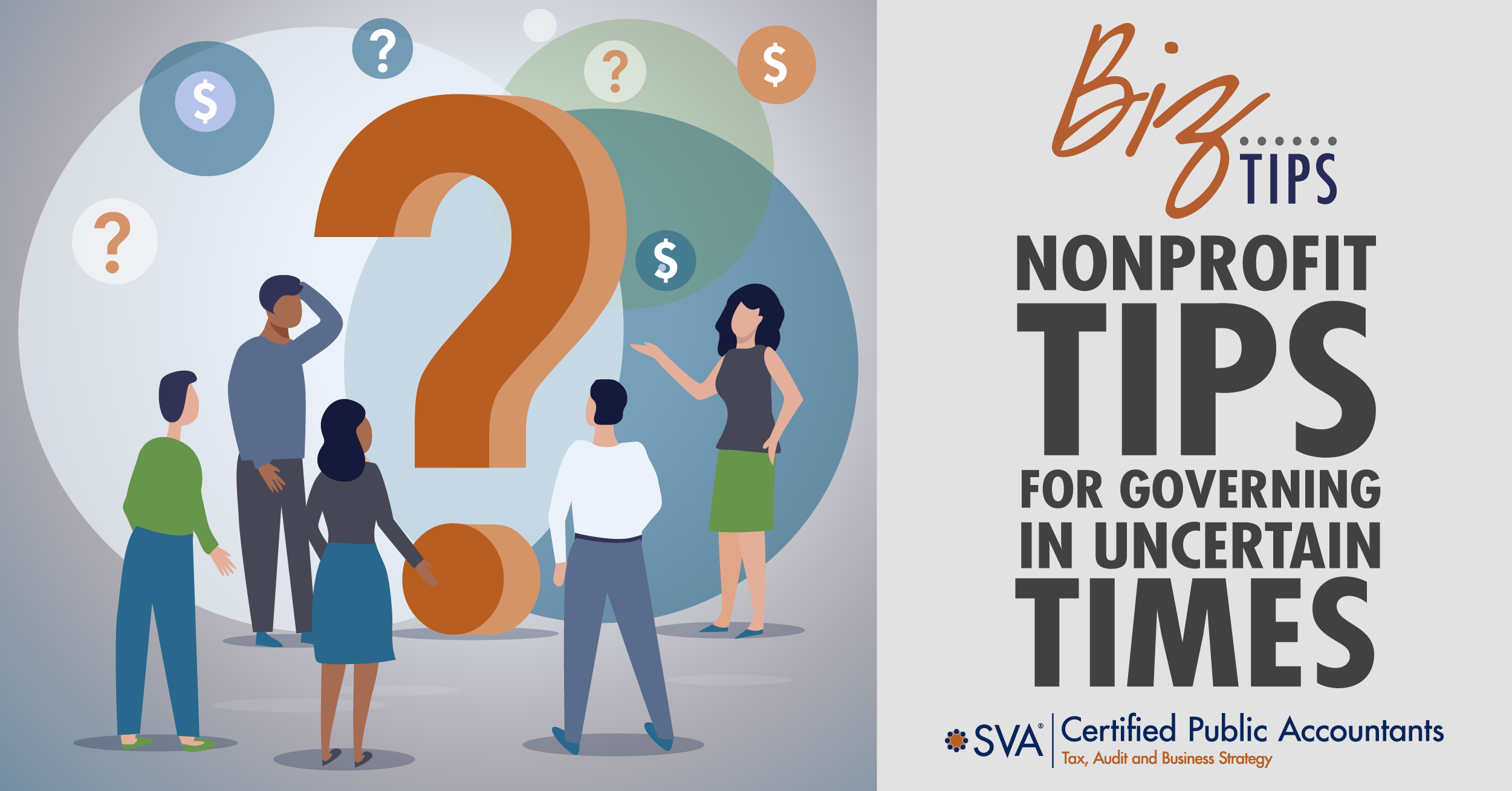

Published on: Dec 17, 2021 by Kirsten Houghton, CPA, MBA
Updated on: October 10, 2025
Nonprofit organizations continue to be in a stage of uncertainty regarding the long-term impact of COVID-19 and have entered the new paradigm. Every organization made quick adjustments with remote working for employees and volunteers. The question is, "Are employees and volunteers efficient and productive?"
Working at home is much better for some people, as they are more efficient and productive, while others struggle. The more significant issue in the future is a reluctance by some to return to the office. As teams have adopted technology, there is a comfort level of working remotely, which is here to stay. With that comes an increase in technology needs.
Creating innovative solutions to serve clients in a hybrid world will continue to be the focus. This paradigm switch creates the necessity to evaluate your processes, procedures, programs, staffing, and technology. In this article, we will discuss the path forward and how to not only survive but thrive.
As staff transitions to remote working or a hybrid situation, there should be adjustments to your internal procedures to maintain appropriate internal controls. In the past, it was easy to lock up the office at the end of the day and know your data was secure.
Remote working will be a long-term situation and your internal control processes will need to reflect today's work environment.
Adjustments to internal procedures and oversight should include:
Keeping your governing boards current is more critical than ever so they fully understand what is happening with your organization. Work with your board to make sure they are engaged and know the effect today's working environment has on your nonprofit.
The discussions should include what is in place now, plans for pandemic ebbs and flows, financial impacts, and public perception of your organization.
RELATED CONTENT: EGUIDE
BOARD GOVERNANCE: WHAT ARE THE ROLES AND RESPONSIBILITIES OF YOUR BOARD MEMBERS?
Many programs that helped nonprofits during the pandemic (e.g., PPP loans, Employee Retention Credit, Shuttered Venue Grants) are now phasing out. As those programs end and nonprofits continue to navigate the future, a financial roadmap should be developed.
Your financial liquidity plan should include:
COVID testing protocols for your employees and the constituents you serve should be in place and will vary depending on your organization.
Institute testing protocols to ensure health and safety for:
With an effect on business as usual for over a year and a half, reviewing the status of your assets is essential. If you have inventory, did that value go up or down? With supply change shortages, your inventory’s value may be higher now.
Consider the effect on organizational assets regarding:
At the start of the pandemic, it was a fast learning curve to survive, with quick pivots to online options. Now it's time to think about what's ahead so you can not only survive but thrive.
Talk to your donors about their ability and willingness to donate. If you have restricted gifts, talk to the donors about your organizational needs. They might be willing to recharacterize those gifts to dollars that can be used for operational needs. Many private foundations were flexible with the gifts and ready to support a general need versus a specific program.
Develop a plan for open communication including:
Beyond the remote working needs for your staff, what hybrid options will continue for your organization? Things will never return to 100% of what they were, and consumers have quickly adapted to hybrid options. Putting on an all virtual or hybrid event requires understanding the patron's experience.
Look at best practices and invest in the technology you need to ensure a good experience. Technology investments also include cybersecurity protections, which is one of the biggest threats to all organizations. Get professional help to ensure your organization and donor information is safe and secure. Nothing is more detrimental to your organization than a security breach.
Each organization has its own challenges depending on its mission and clientele. The ability to adapt to the ever-changing environment and stakeholder needs is critical to your organization's ability to not only survive these times but to thrive in the current climate and in the future.
Communication is vital and management must continually monitor the concerns. Organizations should be posting regular updates on their COVID-19 protocols on their website and share with their stakeholders.
Social Service Organizations (e.g., food banks, soup kitchens, counseling services, and charity clinics) saw a rising demand for their services while also facing challenges in fundraising. There were high ratios of fundraising expenses to contributions raised and low program expenses to total costs. These organizations need a plan to explain their ratios to both donors and the public.
Educational Organizations faced reduced enrollment and are waiting for a return to entirely in-person instruction. Underutilized housing, dining, and meeting facilities still must be maintained. These organizations continue to deal with travel hesitancy and limited in-person group activities leading to reconfiguring meeting spaces, additional medical testing, and facilities for sequestering persons who test positive. Communicate plans to students, parents, faculty, staff, donors, alumni, regulators, and residents of the town where the institution is located. Traveling to game locations will require special care to ensure athletes, coaches, staff, and fans are meeting your requirements.
Public-Centered Organizations have shown the creativity and willingness to keep trying different ways to serve their clientele. Visual arts, performing arts, and cultural organizations are faced with limitations on their activities and local government restrictions. Virtual exhibits and performances require discussions on whether the virtual cost should be the same as in-person events. A reduction in participation means a decline in contributions and onsite sales. Many patrons are enthusiastic about returning to participating in the arts, so now is the time to capitalize on the opportunities as people welcome a return to these performances.
The pandemic forced us to acknowledge technology's significant role in fulfilling an organization’s mission. Here are a few planning tips you should be working on:
The pandemic opened a new world of connectivity to your donors and stakeholders. Nonprofits who used the power of virtual and electronic communications to disseminate their message to a larger audience had an advantage. The ability to involve donors and stakeholders across the world in a single event is powerful. Continually look for opportunities to offer new online services moving forward.
Private sector partnerships can be an alternative revenue source. Explore grant funding more aggressively. Perhaps your organization was fine without grants, or you didn't feel you had the time to explore the process. Now is the time to look for opportunities you might not have explored previously as a funding source.
Get creative and go after those dollars. Is now the time to join forces with organizations that provide similar or complementary services? A collaborative agreement can offer efficiencies, allowing both organizations to offer more value to achieve their missions. Acquisitions or mergers are also ways to build a more vital organization.
Every nonprofit has its own identity and passion for its mission. Still, sometimes it makes sense for organizations to align, creating one vital organization to carry on into the future.
Using dashboards and benchmarking tools will provide insights on where your organization is now and trends that will help you predict the future.
The benefits of using data analytics are:
Do you have a senior executive team or board of directors? Engaging younger members may be more accessible with the increase in technology. Now is the time to embrace a proactive attitude. With the strain on workforce and hiring that many businesses face, you may need to expand your talent pool beyond the city or state in which your organization resides.
It is always an excellent exercise to review if your board represents the people your organization serves. Take a critical look at your board to determine the range of experience, generational representation, and diversity in race and gender. What is your succession plan for your board? Implement a policy to rotate in new board members and a proactive plan for replacing leadership members as they approach retirement.
Develop a pipeline of board and committee members to keep everyone engaged and excited about the future. The role of your board has changed and you need members who are ready to assess, adapt, be agile, and be responsive.
Board discussions should include:
Recorded Webinar: Leading with Intent - Your Board's Role in Planning for the Future
Every organization is facing the same issues and what will differentiate you is how you adapt to the new future. There won't be a complete "return to normal" as the pandemic has forever changed workforce and donor expectations.
Talk with your leadership team and enlist experts such as your accounting firm and auditor. Many times these key advisors can provide a valuable outside perspective.
© 2021 SVA Certified Public Accountants
Share this post:

Kirsten is a Principal with SVA Certified Public Accountants and her expertise includes the nonprofit and real estate industries. In addition to providing audit, accounting, and tax services, Kirsten also provides review, compilation, and management advisory services.
Get Weekly Biz Tips Delivered Straight to Your Inbox!
Services
Madison, WI
1221 John Q Hammons Dr, Suite 100
Madison, WI 53717
(608) 831-8181
Milwaukee, WI
18650 W. Corporate Drive, Suite 200
Brookfield, WI 53045
(262) 641-6888
Colorado Springs, CO
10855 Hidden Pool Heights, Suite 340
Colorado Springs, CO 80908
(719) 413-5551

Are you in the know on the latest business trends, tips, strategies, and tax implications? SVA’s Biz Tips are quick reads on timely information sent to you as soon as they are published.
Copyright © 2026 SVA Certified Public Accountants | Privacy Policy | Cookie Policy | CCPA